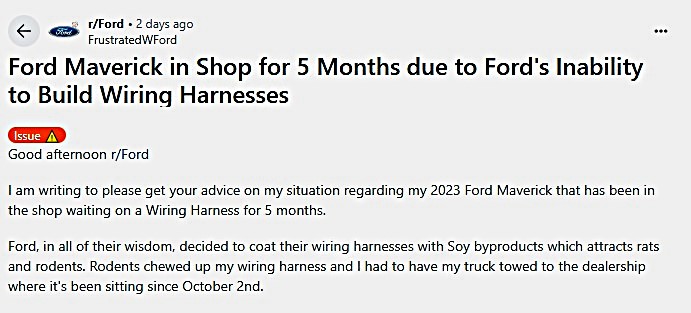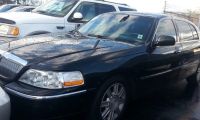A recent discussion on the Reddit r/Ford forum raises an interesting question of who to blame when essentially an "Act of God" happens to a 2023 Ford Maverick that should be a simple fix but turns out is not.

During the past 5 months, the Ford Maverick owner states that he has taken the following actions:
- Created a case with Ford Corporate in October 2024.
- Was able to secure a loaner vehicle from the dealership (I'm grateful and they've loaned me 8 new trucks since this all started).
- I've searched for the wiring harness online, Part Number PZ6Z14A318BAA. I've placed orders on 3 different websites but they always cancel the orders since they cannot find the part.
- Last week, Ford Corporate & the dealership let me know they cannot build the wiring harnesses because they cannot source the materials to even build them. Ford corporate recommended I try selling my truck where I would likely incur a financial loss.
Leaving the Maverick owner turning to advice for help from other Ford owners.
The Source of the Problem?
If you scour the internet, you would be led to believe that the problem's most fundamental source is that Ford and many other automakers use soy-based wiring in their vehicles.
The reason for this is that soy-derived oil works well as an eco-friendly renewable resource when used as insulation material in electrical wires, such as wiring harnesses, used in automobiles.
As a result, rodents are attracted to soy-based wiring and cause thousands of dollars of preventable damage that Ford and other automakers should be held responsible for.
But is this soy-based-electrical-wire-rodent-feeding-frenzy true? Or is it one of those anecdotal myths that "sounds right" and, therefore, must be true?
According to a convincing article titled "Car Talk Helps Bust the Myth That Soy Is Why Rodents Are Eating Your Car's Wires" there is no credible evidence that rodents find soy-based electrical wire especially edible.
In fact, in a more recent article, we learned that Toyota Tacoma owners were warned that in some situations, rodents were known to have a special liking for the rubber boots on the transaxle, CV boots, and suspension system, which are not soy-based.
Furthermore, rodents have a history of chewing the wires under the hoods of cars long before the invention of "eco-friendly renewable resources" was part of our vocabulary. If you have ever lifted the hood of an old barn-find, you will know this is true.
The Real Source of The Problem: Where to Shift the Blame?
The frustration of the Ford Maverick owner is understandable, and I can sympathize. Waiting for five months only to learn that his truck is, for all intents and purposes, totaled when what should be a simple fix is not a simple fix would be draining on anyone.
As such, you can feel the wide-ranging frustration in the comments in the thread, which point the blame on the dealership, Ford Motor Co, insurance companies, and the laws that should protect car owners in these kinds of situations, etc.
And I get it.
Why can't someone at Ford "find" a replacement wiring harness so that the fix can be done and make the Maverick owner a satisfied customer?
Because they do not have to.
Wires chewed by rodents are not a warranty issue. It is an owner-insurance coverage issue.
If we accept that the myth, or at best, anecdotal evidence, that rodents are more attracted to soy-based wire than traditional automotive electrical wire is untrue, then Ford is not reasonably responsible.
Unfortunately, we do not live in a reasonable world. As a litigious society, we are used to finding someone to pin the blame on from some manipulation (some would call it "interpretation") of the law to get what they or their client wants.
In fact, according to a Commonwealth of Massachusetts "Mass Consumer Affairs" blog, we see that they are telling their constituents, "It's important for consumers to know that, as unusual as it sounds, defects related to soy-based wiring are NOT excluded from Lemon Law protections," using a vague "the dealer has to disclose any material fact that would affect a consumer's decision to buy the car" logic supported by a linked page of Motor Vehicle Regulations that is questionably helpful or even accurate when it comes to something that is not proven to be true.
In that same vein, I suspect that Ford Motor Company has lawyers who have already advised them that the safest course of action on the soy-based wire complaints is inaction. In other words, accepting any responsibility or action to ameliorate the Maverick owner's problem invites future legal headaches.
For example, what is to prevent thousands of Ford truck owners from coating their wiring harness with peanut butter, leaving it in a barn, and allowing nature to do the rest so that they can file a soy-based wire lawsuit?!
The Best Recourse for the Ford Maverick Owner
Much to his credit, the thread clearly shows that the OP is not playing a blame game—only that many of the comments are.
While he questions why Ford cannot take an existing harness off the assembly line to replace his damaged one, which on its surface sounds like a reasonable request and a solution to the problem, some posts point out that, in reality, automotive manufacturing does not operate that way.
For the OP or anyone else who faces this same problem after exhausting all polite communications with the dealership and the manufacturer, the best recourse is to let their insurance provider do their job for situations like these.
After all, it really is an owner-insurance coverage issue.
Here is a useful article about how to protect your vehicle from rodent damage titled, "Spot Mouse and Rodent Trouble Under Your Hood Before It's a Disaster."
We Want to Hear From You: Have you ever had rodent damage to your car? Are you convinced by the article that soy-based wiring is not a problem? Please tell us what you think in the comments section below.
Timothy Boyer is an automotive reporter based in Cincinnati who currently researches and works on restoring older vehicles with engine modifications for improved performance. He also reports on modern cars (including EVs) with a focus on DIY mechanics, buying and using tools, and other related topical automotive repair news. Follow Tim on Twitter at @TimBoyerWrites as well as on Facebook and his automotive blog "Zen and the Art of DIY Car Repair" for useful daily news and topics related to new and used cars and trucks.
COMING UP NEXT: I Bought a 2017 Toyota Prius with 69k Miles For $14,500. It Was A Hell Of A Deal, But There Ended Up Being A Catch.
Image Source: Deposit Photos
Set Torque News as Preferred Source on Google












Comments
Ford would rather feed the…
Permalink
Ford would rather feed the rodents that brings revenue to them later on...sounds like a pretty good gig...I bought my first and last Ford 51 years ago.i learned quickly not to reward companies for the garbage they sell
A Ford from the 70's?! They…
Permalink
In reply to Ford would rather feed the… by Boob (not verified)
A Ford from the 70's?! They are my favorite Fords!
If you don't mind sharing, what model was yours and what was the problem?
Thanks for the input!
I work as an inspector in a…
Permalink
In reply to A Ford from the 70's?! They… by Timothy Boyer
I work as an inspector in a army support shop and every couple of months we get a vehicle with .major electrical problems. The first place I look in the fuse panel looking for mouse crap a out 90 percent the I find it and chewed wiring and if the operator left the battery switch on maybe a couple of fried mice costly repair!!
A Ford from the 70's?! They…
Permalink
In reply to Ford would rather feed the… by Boob (not verified)
A Ford from the 70's?! They are my favorite Fords!
If you don't mind sharing, what model was yours and what was the problem?
Thanks for the input!
Soy-based wiring is a very…
Permalink
In reply to Ford would rather feed the… by Boob (not verified)
Soy-based wiring is a very REAL problem. I work for a major telecom company and it's not unusual to find squirrel damage on our fiber cables but none on the copper cables which have been up for decades. Your internet out? 9 times out of 10 a squirrel chewed through the fiber somewhere!
What about a harness from a…
Permalink
What about a harness from a wrecked maverick or have insurance total the vehicle if it cannot be repaired. It is not uncommon for this issue to occur where parts are not available.
Yep, all good…
Permalink
In reply to What about a harness from a… by ELDIABLO (not verified)
Yep, all good recommendations. I would not have waited 5 months, but I cannot judge. I can understand not wanting an otherwise good vehicle to wind up totaled.
Thanks for the input.
They use soy derived wiring…
Permalink
They use soy derived wiring because it's cheaper. Soy is cheap in general so some type of soy derivative is in almost half the groceries we eat. Again because it's cheap. It's unhealthy to eat and it's unhealthy for your vehicle.
I think I've also heard it…
Permalink
In reply to They use soy derived wiring… by Raf (not verified)
I think I've also heard it has endocrine properties that might not always be healthy or desirable for men.
Thank you for responding.
I had a wiring harness…
Permalink
I had a wiring harness chewed on by a cottontail rabbit. Dodge replaced the wiring harness. I paid for the repair.
Ha! My kid's house rabbit…
Permalink
In reply to I had a wiring harness… by Louise Schweyer (not verified)
Ha! My kid's house rabbit did the same thing with a lot of the electrical cords in our house. Can't explain it.
Thank you for the response.
Almost a 600 dollar bill to…
Permalink
Almost a 600 dollar bill to get my Maverick on the road even though it was still under warranty. But not covered do to rodent damage. My wiring harness was totally chewed up to the point half the harness was gone. Throwed check engine light . Fuel pressure sensor fault. Checked the Maverick forums on Facebook. Many experiencing the same check engine fault. Then dealer says rodent damage to harness. Ridiculous!!
Sorry to hear that, but yeah…
Permalink
In reply to Almost a 600 dollar bill to… by Jason (not verified)
Sorry to hear that, but yeah, that is another point when blaming a rodent keeps the myth going to deny coverage.
Thanks for the comment.
I have a 2022 Ford Maverick…
Permalink
I have a 2022 Ford Maverick that had the wires chewed and cost $1400 to repair at my Ford dealership. I have parked many vehicles in the same spot for 43 years and the Maverick was the first vehicle to have rodent damage done to it.
If it is any consolation, I…
Permalink
In reply to I have a 2022 Ford Maverick… by Rocky L. Thein (not verified)
If it is any consolation, I've had three rodent vs wire experiences: One on a Dodge Dart kept in a carport (car would not start); a second one with a Chevy Chevette parked outdoors on campus (AC would not turn on); and a third with a brand new Toyota Camry I was responsible for during a summer house sitting gig that ended in a fire while driving in Tucson.
Damn rodents!
Thank you for your input.
Mice destroyed my 2005 Dodge…
Permalink
Mice destroyed my 2005 Dodge Dacoma by chewing insulation our of my wiring harness. It happened over the course of years, chew by chew, short by short until nothing was working including the ignition. I had to have it towed away then. I tried all of the tricks in the book including the ones posted here. Some only slowed them down. In the end, none of them worked. I didn't have my truck for long enough for my next plan, to keep it sealed in a fumgated shipping container when I wasn't using it. I don't know what my insulation was made of. I suppose that could be looked up. But to be certain, the woodmice at my cabin absolutely loved it.
I've seen barn finds with…
Permalink
In reply to Mice destroyed my 2005 Dodge… by John T. Vaughan (not verified)
I've seen barn finds with mouse bedding, nuts, string, and God knows what else packed into all sorts of odd places in cars. If anything, rodents are persistent and from what I have heard is that the anti-rodent stuff you can spray on wiring only slows them down a little or they move onto some other part of the car.
Thank you for sharing.
I have a 2015 Ford F150 and…
Permalink
I have a 2015 Ford F150 and have had 3 separate incidents were rodents, most likely rats, ate wiring under the hood.. Damage totaled over $4,000 and fixed by my local Ford dealer, but paid for (less $100 deductible) by my car insurance company under comprehensive coverage.
I can understand why Ford wont cover repairs since its not a warranty item. Insisting that Ford cover repairs isnt going to work. I can understand why they wont cover it.
After 5 months I would think he would just turn it over to his insurance.
I now keep a shop light on overnight under the hood and havent had another problem since I did that.
Hey! That's not a bad idea…
Permalink
In reply to I have a 2015 Ford F150 and… by Fred Heske (not verified)
Hey! That's not a bad idea to try. Thanks for the tip.
Much appreciated.
I have a 2015 Ford F150 and…
Permalink
I have a 2015 Ford F150 and have had 3 separate incidents were rodents, most likely rats, ate wiring under the hood.. Damage totaled over $4,000 and fixed by my local Ford dealer, but paid for (less $100 deductible) by my car insurance company under comprehensive coverage.
I can understand why Ford wont cover repairs since its not a warranty item. Insisting that Ford cover repairs isnt going to work. I can understand why they wont cover it.
After 5 months I would think he would just turn it over to his insurance.
I now keep a shop light on overnight under the hood and havent had another problem since I did that.
Same with me. I've had three…
Permalink
In reply to I have a 2015 Ford F150 and… by Fred Heske (not verified)
Same with me. I've had three rodent vs wire experiences: One on a Dodge Dart kept in a carport (car would not start); a second one with a Chevy Chevette parked outdoors on campus (AC would not turn on); and a third with a brand new Toyota Camry I was responsible for during a summer house sitting gig that ended in a fire while driving in Tucson. The owners blamed me and asked me to leave. No thanks from them that it happened just before their daughter was taking the car that weekend for a road trip. Oh well.
Thanks again!
Whoever produced the wiring…
Permalink
In reply to Same with me. I've had three… by Timothy Boyer
Whoever produced the wiring harness knew tge animals feed on those wiring with soy or peanut type oils. When I worked at a Chevrolet dealership in the 80s and 90s, we never replaced a wiring harness unless it was fire damage. We always repaired them. It seems nowdays techs won't repair unless it's their own, they want to replace. Wiring harnesses now go for thousands of dollars. I heard from a friend of mine where he paid 20 grand for replacing a wiring harness on his 2016 KW T 680. I'm glad I still have my 1992 Suburu Legacy.
Yes, those harnesses do not…
Permalink
In reply to Whoever produced the wiring… by Kell Kelley (not verified)
Yes, those harnesses do not come cheap. If there were a conspiracy or just a plain engineering "D'Oh!" it would be interesting to know.
Thanks for the input.
Don't feel to bad, I work…
Permalink
In reply to Same with me. I've had three… by Timothy Boyer
Don't feel to bad, I work for a major airline and we had a rat eating wires and insulation on one of our jets. We sealed the Aircraft several times and gassed him and it took us over 30 days to get him. Cost us a dearly in lost revenue.
Ok, another fact to add to…
Permalink
In reply to Don't feel to bad, I work… by Sam (not verified)
Ok, another fact to add to my feelings about flying.
Make sense thought.
Thanks for the share.
I'm an insurance adjuster…
Permalink
I'm an insurance adjuster and I have certainly seen an uptick in rodent related wiring harness damages. It seems to be more prevalent since the soy based coating was first introduced. This is my job and truly feel the manufacturers are refusing to accept responsibility for this because of they cannot come up with one wiring harness alone let alone many many more if there was a recall.
At the very least there…
Permalink
In reply to I'm an insurance adjuster… by Gwenn Powers (not verified)
At the very least there needs to be a statistical analysis of the reports of incidences. Then, if the numbers agree with what owners are seeing, a study should follow and put this soy-based wiring question to rest.
Thank you for sharing.
Being a former Ford service…
Permalink
Being a former Ford service technician l can honestly say that I have repaired many vehicles with rodent damaged wiring, and all were not covered under warranty. That being said I either replaced the harness when available or repaired the harness with bulk wire and connectors. It would seem to me that the current technicians would rather be a parts replacer than an actual technician that knows how to actually repair a vehicle which is what I would do under the circumstances.
Yeah, those days of fixing…
Permalink
In reply to Being a former Ford service… by Jeff H (not verified)
Yeah, those days of fixing rather than replacing seem to be gone. However, I can imagine the risk of a lawsuit should the repair fail.
Thank you for your input.